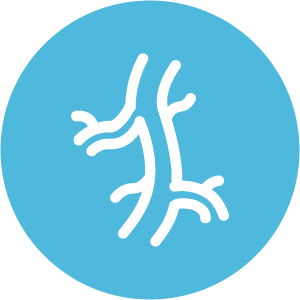Peripheral Artery Disease
Peripheral artery disease (PAD) refers to the narrowing of the “peripheral” arteries, which are blood vessels in the legs, arms, stomach and head. It is caused by a buildup of cholesterol and scar tissue on the walls of the artery which forms a substance known as plaque. The plaque builds up gradually and over time it will clog the artery, restricting the flow of blood. In some cases, PAD may be caused by blood clots that break free from within larger arteries and get lodged in narrower arteries, which reduces blood flow.
PAD is most often diagnosed within the legs. Left untreated, it can lead to painful cramping, limited mobility, amputation, gangrene, infection and even death. Fortunately, there are several highly effective treatment options if PAD is detected early.


